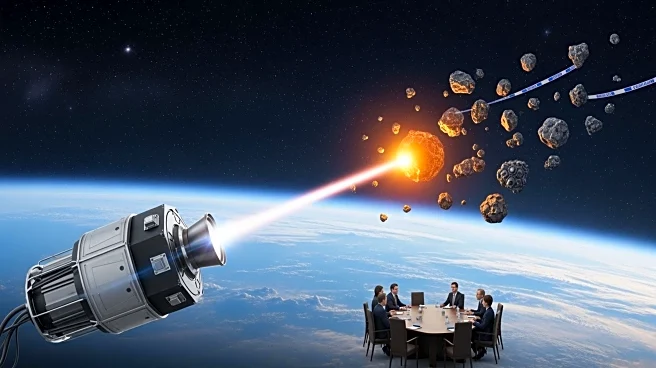What's Happening?
The ALBATOR project, funded with a 3.9 million Euro ($4.6 million USD) grant, is investigating the use of ion beams to remove space debris without physical contact. This initiative aims to address the growing
issue of space debris, which poses a threat to satellites and the International Space Station. The European Space Agency estimates there are up to 140 million pieces of orbital debris as small as 1 mm. The project, coordinated by the French startup Osmos X, seeks to develop non-kinetic methods to safely maneuver debris away from critical space infrastructure. ALBATOR is part of a European Innovation Council Pathfinder program, which supports high-risk, high-reward technological projects.
Why It's Important?
The proliferation of space debris is a significant challenge for space sustainability, as it increases the risk of collisions with operational satellites and space stations. The ALBATOR project's approach, using ion beams, offers a potentially safer and more versatile solution compared to traditional methods that require physical contact, such as nets or docking. This technology could revolutionize how space agencies and companies manage debris, ensuring safer space operations and protecting valuable assets in orbit. The project's success could lead to new markets and opportunities in space technology and debris management.
What's Next?
The ALBATOR project is set to run until February 2029, with a focus on developing and testing the ion beam technology. While a flight date for a technology demonstrator has not been announced, the project's progress will be closely monitored by stakeholders in the space industry. The involvement of universities in Spain and Germany, along with the Luxembourg branch of NorthStar, highlights the collaborative effort to tackle space debris. As the project advances, it may influence future policies and strategies for space debris management globally.
Beyond the Headlines
The ALBATOR project not only addresses immediate concerns about space debris but also raises questions about the long-term sustainability of space exploration. The development of non-contact debris removal technologies could set new standards for environmental responsibility in space. Additionally, the project's success could inspire further innovation in space technology, potentially leading to advancements in other areas such as satellite propulsion and space situational awareness.










